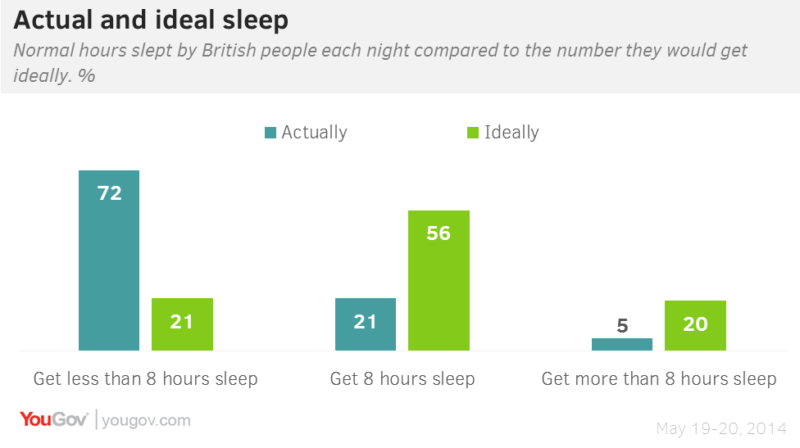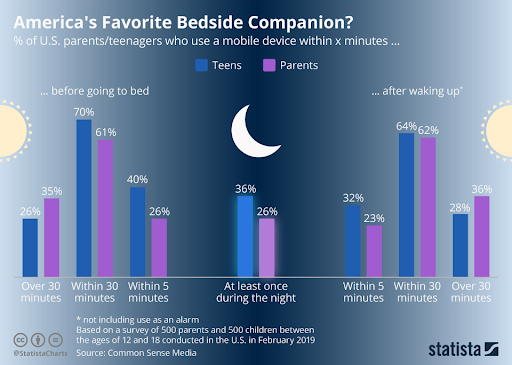It is finally the evening. The kids are in bed and you’ve just managed to switch off your computer for a long night of peaceful sleep.
You climb beneath the covers, scrolling through Facebook until your eyes begin to droop, before laying your head down for another night of tossing and turning, staring at the clock, and replying to that 3 am email on your phone.
Does that sound like you? Constantly waking up feeling more exhausted than they were in the evening? Well, fear not, work from home insomnia is more common than you think.
In fact, 40 percent of corporate Americans say that they currently struggle with insomnia, and working from home has only made it worse.
While the National Sleep Foundation suggests that the average adult should receive 7-9 hours of sleep a night, over one-third of the population gets less than 6.

As the work-from-home population has nearly doubled since the onset of the Covid-19 pandemic, we have begun to see the rise of the WFH insomniac, the serial toss, and turners that are currently holding down a corporate position while trying to keep their eyes open. If this sounds like you, it is time to make a change.
Read on to find out why prioritizing your sleep schedule is the key to WFH success and how you can change up your habits to revolutionize your nighttime routine. Say goodbye to the WFH insomniac and welcome a refreshed version of yourself.
How Can Sleep affect Our Work?
Sleep is the remedy for all parts of our body, from mental wellness to physical fitness, as our eyes fall shut and our muscles relax our neurons transcend to their sleeping state. As we lay in slumber, sleep provides the rejuvenation our body is craving.
Sleep assists both our immune and cardiovascular systems, alongside the function of the brain, aiding our ability to stay healthy and to continue learning and processing our emotions.
When we consistently receive lower levels of REM sleep, our bodies begin to lose their ability to rejuvenate, making us more susceptible to health problems and reduced mental wellbeing.
WebMD states that: “Sleep deprivation induces significant reductions in performance and alertness. Reducing your nighttime sleep by as little as 1.5 hours for just one night could result in a reduction of daytime alertness by as much as 32 percent.”
Therefore, those holding down a full-time job either remotely or in the office need to be getting the full 7-9 hours of sleep in order to perform successfully within their position. Well-rested workers are not only more likely to be more focused during the workday but have a more successful life outside of the office too.
If you are desperate to switch up your own sleep schedule for a more successful WFH experience, here are three ways to improve your sleeping habits while working remotely.
How To Improve Your Sleeping Habits While Working Remotely
Whether you are an early morning motivator or a night owl worker, working from home has thrown just about everyone’s schedule out of whack.
As more people are reporting increased levels of stress post-pandemic, adjusting your sleeping routine could be the remedy you have been looking for.
1. Stick To A Schedule
This might seem absurd, but sticking to your pre-pandemic working schedule could be the key to success.
You know that extra hour you are currently enjoying in bed? Well, it is time to pretend that your commute is longer than the route from your bed to the kitchen and start waking up early again.
Experts suggest that mirroring your office routine will not only increase productivity throughout the day but also improve your sleep quality. Following a consistent daily routine and an assigned 8 hours of sleep will allow your brain to turn off easily when it comes to relaxing.
Work from 9-5 and then switch off both physically and mentally for the best results. Allowing yourself to separate work from your evening routine will help to reduce stress, burnout and most importantly see you slumbering for the optimal amount of time for peak mental and physical health.
2. Unplug Before Bed
As much as we enjoy scrolling through our social media feeds into the early hours, eagerly waiting for our eyes to fall shut, it is time to admit the truth. Our phones may be the problem.
With 26 percent of adults checking their phones only 5 minutes before going to bed, it is time to talk about the effects of the online insomniac.

According to SCL Health: “The blue light emitted by your cell phone screen restrains the production of melatonin, the hormone that controls your sleep-wake cycle.” suggesting that consistent screen use before bed could be adding to your sleeping woes.
Instead, why not unplug an hour or two before bed and switch to a more relaxing form of pre-sleep entertainment. Whether it is a book or a calming podcast, try reducing your screen time if you are looking to see a quick improvement in your sleeping habits.
For those of you struggling to turn off, why not try a pair of blue light glasses to help reduce the effects of the blue light on your eyes. For daily screen users, why not also incorporate these into your working day, to reduce headaches and eyestrain throughout your shift.
3. Start Moving
For those of us swapping the office for our WFH couch, it’s hard to stay as active as we once were pre-pandemic. As much as we enjoy that extra hour of rest in the morning, or lounging around in our favorite pair of comfy joggers, it’s time to strap on that exercise watch and start tracking those steps.
In fact, the National Sleep Foundation claims that there is a strong correlation between exercise and improved sleep quality. In a recent study, they found that 67 percent of people have a better night’s sleep after exercising for 30 minutes during the day.
Working out aids both physical and mental health, making the muscles tired and relaxed for slumber and your brain less busy, for a stress-free night.

Rebecca is a journalist and blogger specializing in the health, business, and technology sector.


